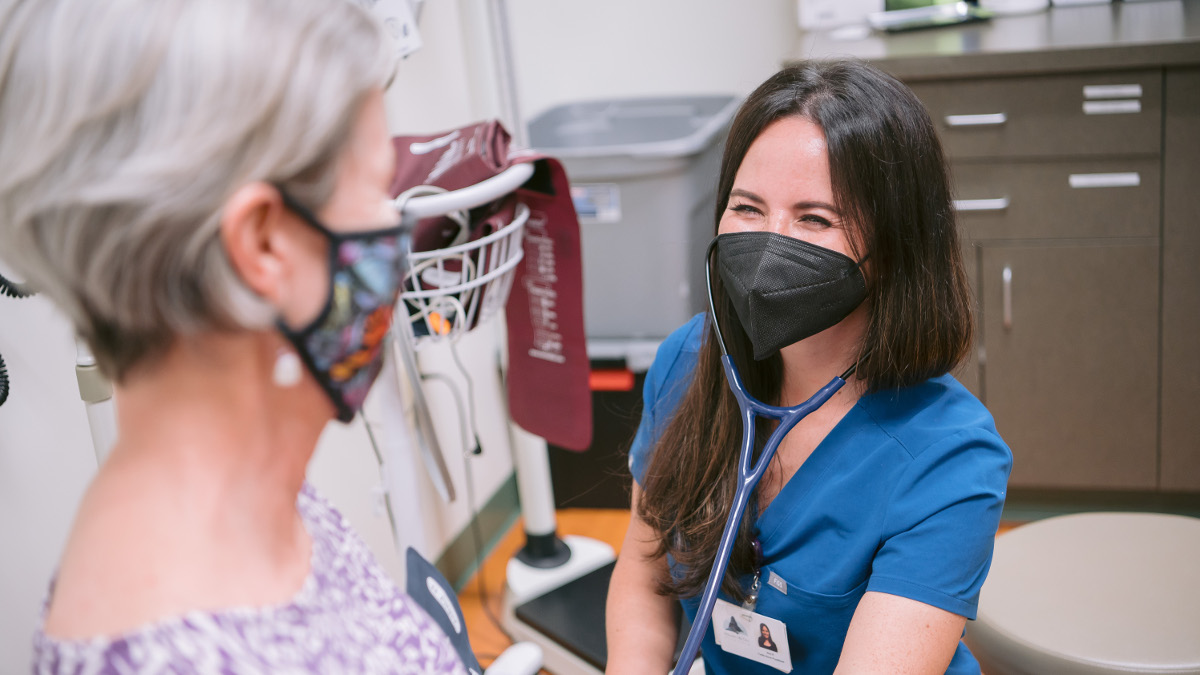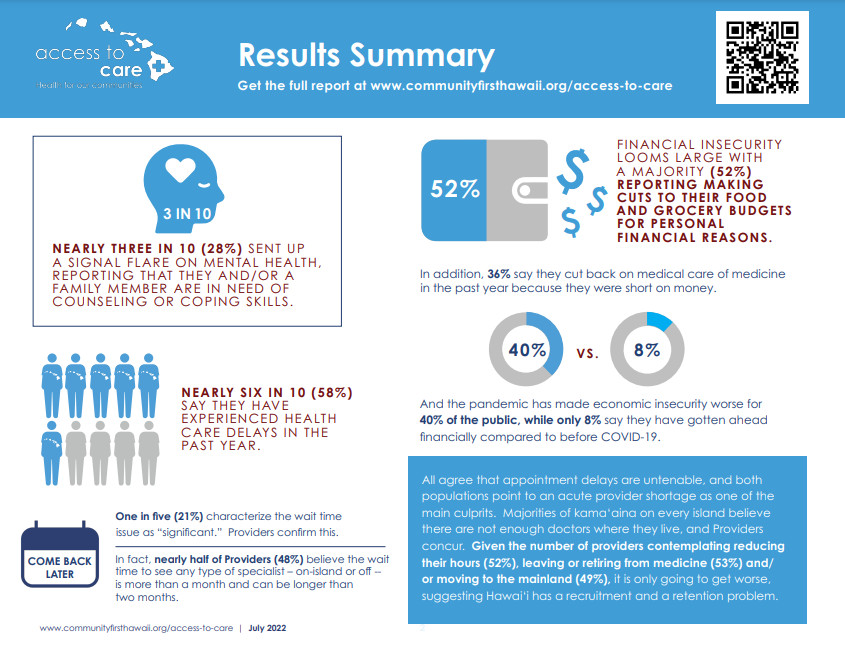(BIVN) – A report from the Access to Care research initiative detailing the results of a statewide survey shows “troubling results”, as Hawaiʻi struggles with a number of issues when it comes to access to health care.
On Tuesday, the non-profit Community First – together with healthcare, government and social services partners – released the data it has gathered in its effort “to better understand local communities’ barriers in accessing the care they need to be healthy.”
From the Community First news release:
Nearly 3,300 Hawai‘i residents participated in the research survey in Spring 2022. Access to Care is a comprehensive 360-degree healthcare assessment that combines data from resident surveys, input from healthcare and social service providers, and feedback from policymakers into a snapshot to better understand the terrain of the healthcare landscape of Hawai‘i. Methodology included focus groups, an online public survey, and in-community outreach in neighborhoods across each island to ensure representative results that reflect the realities of our communities.
“I cannot afford to see a doctor or receive medical or surgical care. It’s strange how inconsequential we become to society as we age. I spent most of my life giving to my community only to find out I no longer matter,” wrote one survey respondent. Another wrote, “I feel invisible, unheard and that no one cares about our family in the health care community. It’s never been like this before.”
According to the researchers, the top-line findings include:
“Many people in Hawaiʻi are hurting right now; the pandemic has taken a toll on financial, physical, and mental wellbeing”
- While a majority (55%) view our island communities as healthy, much of the survey tells a different story. It is one of strife, hardship, and need.
- Financial insecurity looms large with a majority (52%) reporting making cuts to their food and grocery budgets for personal financial reasons. In addition, 36% say they cut back on medical care or medicine in the past year because they were short on money. And the pandemic has made economic insecurity worse for 40% of the public, while only 8% say they have gotten ahead financially compared to before COVID-19.
- Mental (38%) and physical health (33%) are deteriorating among the public in the past two years. Similar numbers of Medical Providers say their mental (38%) and physical (36%) health has declined.
- Nearly three in 10 (28%) report that they and/or a family member are in need of counseling or coping skills.
“Health care is delayed”
- Nearly six in 10 (58%) say they have experienced health care delays in the past year. One in five (21%) characterize the wait time issue as “significant.”
- Majorities of kamaʻaina on every island believe there are not enough doctors where they live, and providers surveyed concur.
- Given the number of providers contemplating reducing their hours (52%), leaving or retiring from medicine (53%) and/or moving to the mainland (49%), it is only going to get worse, suggesting Hawaiʻi has a recruitment and a retention problem.
- Psychiatry and mental health counseling are, far and away, the two professional areas needed most, according to providers.
“Equity traps abound”
- The public as well as health care experts in Hawaiʻi realize health care needs, approaches and stigma are different across cultures and require an increase in cultural competency and language access, especially to the Hawaiian, Pacific Islander, and Filipino populations.
- Those suffering the most from the current system, especially when it comes to delayed health care and access to specialists, are Medicaid/MED-QUEST patients.
From the news release:
The researchers found that these multi-layered and broader community challenges complicate the ability to find solutions; Hawaiʻi has greater racial and ethnic diversity, therefore the need for interpretation and translation services for residents with Limited English Proficiency (LEP). Our state has the highest cost of living in the nation, which compounds a number of high needs in rural communities where access to care is a challenge. Many recognize the moment for positive change in health care delivery is now.
“We have opportunities for creating an abundance of positive change to improve healthcare quality and safety, raise employee engagement, and increase patient satisfaction and care.” Providers report a greater willingness to collaborate, communicate, and coordinate in order to improve health care delivery for all,” said one health care professional interviewed for the survey.
Access to Care started in summer 2021, with initial assessment of Hawaiʻi Island’s healthcare system including informal meetings with policymakers and focus groups with healthcare leaders. In fall 2021, Access to Care conducted a pilot survey on Hawaiʻi Island before expanding to a statewide research initiative in April 2022.
Having released the report, the Access to Care project will convene working groups to examine the findings and seek action and solutions. Briefings on the report findings are underway now at all levels of state-wide and local government, social services and health care sectors.
The full report can be downloaded at accesstocarehawaii.org.



by Big Island Video News11:20 pm
on at
STORY SUMMARY
HAWAIʻI ISLAND - The statewide "Access To Care" survey provided insights into the barriers that local communities face in accessing healthcare.